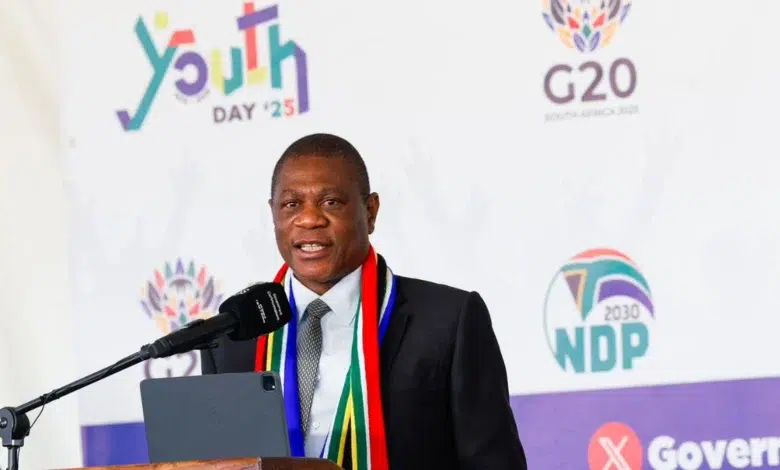Youth Day 2025: Mashatile Shares Solutions to Tackle South Africa’s Youth Unemployment Crisis

On June 16, 2025, South Africa commemorated Youth Day, a solemn reminder of the 1976 Soweto Uprising where young people courageously protested against apartheid oppression. This day honours the sacrifices of youth who fought for freedom. It also highlights ongoing challenges facing South African youth, particularly the persistent crisis of youth unemployment.

ALSO READ: Over 200,000 Youth Hired in South African Schools to Tackle Unemployment Crisis
The Youth Unemployment Crisis in South Africa
Youth unemployment remains a critical issue in South Africa. Recent statistics reveal a staggering unemployment rate of 46.1% among those aged 15 to 34 in the first quarter of 2025. This means millions of young South Africans are without jobs, education, or training. It severely limits their economic participation and potential.
The crisis is more than an economic problem — it is a moral emergency affecting the entire society. The lack of employment opportunities undermines dignity and steals the potential of the nation’s youth. Many young people have matric certificates, tertiary qualifications, and skills aligned with the Fourth Industrial Revolution. Despite this, they struggle to find work. They face barriers such as lack of experience, limited networks, and systemic challenges that prevent them from entering the labour market.
Deputy President Paul Mashatile’s Address
Deputy President Paul Mashatile delivered the keynote address at the National Youth Day commemoration and career exhibition held at North West University’s Rag Farm Stadium in Potchefstroom. He spoke on behalf of President Cyril Ramaphosa. In his speech, Mashatile acknowledged the severity of youth unemployment and called for urgent, collective action.
He emphasised that addressing youth unemployment requires strong collaboration between government, business, and communities. The government is prioritising education, skills development, and economic growth to bridge the gap between youth capabilities and job opportunities. This year’s Youth Day theme, “Skills for the Changing World – Empowering Youth for Meaningful Economic Participation,” reflects this focus.
Mashatile urged all sectors to accelerate interventions that link young people to education and economic opportunities. He highlighted the importance of coordinated efforts to ensure that skills development programmes translate into real economic gains for youth.
Calls for Action from Political Leaders
Other political leaders also voiced their concerns and solutions during Youth Day commemorations. Economic Freedom Fighters (EFF) leader Julius Malema criticised the government for failing to create sufficient jobs for young people. He urged youth to stand up and fight for their rights, drawing inspiration from the 1976 generation’s activism.
Democratic Alliance (DA) leader John Steenhuisen described youth unemployment as a national tragedy and a failure of justice. He pointed out that millions of skilled young South Africans are losing hope due to lack of job opportunities. Therefore, he called for systemic reforms to address this crisis.
CHECK OUT: Police Step Up Fight Against Gender-Based Violence Amid Ongoing Challenges
Gauteng’s Youth Day Initiatives
In Gauteng, the provincial government marked Youth Day with an event at Morris Isaacson High School in Soweto. This was the site of the original 1976 uprising. The event included a youth expo designed to connect young people with opportunities across government, civil society, and the private sector. The expo aimed to inspire hope and demonstrate commitment to investing in youth futures.
The Gauteng MEC for Sport, Arts, Culture and Recreation, Matome Chiloane, emphasised that Youth Day is not only about remembering the past but also about creating hope through action. The event attracted around 3,000 young people. It featured a wreath-laying ceremony at the Hector Pieterson Memorial, honouring those who lost their lives in 1976.
The Significance of Youth Day
Youth Day commemorates the student-led protests of June 16, 1976. During these protests, thousands of black students marched against the imposition of Afrikaans as the medium of instruction. The peaceful protest was met with brutal police violence, resulting in hundreds of deaths. This included the death of 12-year-old Hector Pieterson, whose image became a symbol of apartheid brutality.
Today, Youth Day serves as both a tribute to the bravery of the 1976 youth and a call to action to empower the current generation. Young people make up about 34% of South Africa’s population. Therefore, their economic participation is vital for the country’s future.
Moving Forward: Empowering Youth for Economic Participation
The government’s approach to tackling youth unemployment focuses on:
- Strengthening partnerships between government, business, and communities.
- Enhancing skills development programmes tailored to the evolving economic landscape.
- Creating platforms like career exhibitions to connect youth with employers and training opportunities.
- Promoting innovation and entrepreneurship among young people.
These measures aim to transform Youth Day from a day of remembrance into a catalyst for meaningful change.
Youth Day 2025 highlighted the urgent need to address youth unemployment in South Africa. Deputy President Paul Mashatile’s call for collaborative action underscores that this crisis requires a united response from all sectors. As the nation honours the sacrifices of the 1976 youth, it must also commit to empowering today’s young people. They need the skills and opportunities required for meaningful economic participation.
The legacy of Youth Day is not only in remembering the past but in shaping a future where South Africa’s youth can thrive. They must contribute fully to the country’s development.




